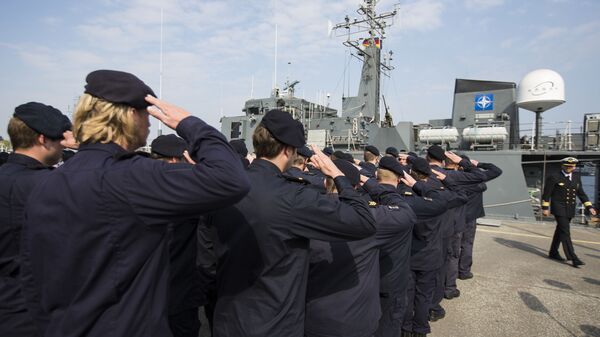While the Norwegian government is yet to decide on whether the country will join a US-led military coalition in the Persian Gulf, ostensibly to protect maritime traffic, the Navy is already working on a possible contribution, Commander Torill Herland, Navy head of communications, told the daily newspaper Klassekampen.
“We'll act where politicians ask us to act”, she said.
According to Klassekampen, Norway's most relevant possible contribution may include frigates, corvettes, special forces, and minesweepers. Royal Norwegian Naval Academy expert Tor Ivar Strømmen, however, stressed that frigates are best suited for the protection of merchant ships. Corvettes may also prove useful, as long as the situation doesn't escalate, since they lack air protection.
In recent weeks, the US and the UK have announced separate plans to put together military coalitions to patrol the Persian Gulf and the Strait of Hormuz and "protect commercial vessels" operating in the area against an alleged Iranian threat. So far, only South Korea has backed the US bid.
The UK launched a military escort for British-flagged ships last Monday and asked other countries to join. So far, the Danish government has welcomed the British initiative and intends to seek support of the Parliament. Norway is yet to make up its mind on either plan.
Experts' warnings
While the Norwegian Navy is contemplating various alternatives for joining a contingency force in the Strait of Hormuz, it should be prepared for full-scale war, Royal Norwegian Naval Academy expert Tor Ivar Strømmen has warned.
“When we go into such an operation, we have to be prepared for war within in minutes. It is not a given that it continues as a peace operation, even though it starts as one”, Strømmen told Klassekampen.
Following the loss of the Helge Ingstad, which sank last November after a collision following NATO drills, Norway has four frigates left, only three of which are operative at short notice. Since one of them is already engaged in NATO's Emergency Force, sending another one to the Strait of Hormuz would mean that Norway has just only a single frigate left.
While stressing the importance of “standing up” for the British and the Americans, Ståle Ulriksen, a fellow researcher at the Royal Norwegian Naval Academy stressed that a proper contribution involves sending a frigate or a corvette. He stressed that the Norwegian Navy has been undermanned for several years and is currently dealing with more and tougher missions amid crew shortages. Frigates also play an important role in monitoring submarine activity in the North.
“The most serious thing about missing frigates is that we will face a vacuum across the northern areas. That vacuum will be eagerly filled by the British, French and, not least, the Americans. Then we lose the right to self-rule in the North”, his colleague Tor Ivar Strømmen stressed.
Tensions in the Persian Gulf
Tensions the the Persian Gulf, which is a major hub for international oil trade, have been increasing after a total of six ships were sabotaged. The US and the UK accused Iran of masterminding the attacks, which Tehran firmly rejects.
In a separate development, Iran's Islamic Revolutionary Guard Corps said that they had downed a US spy drone in June, while Washington claimed that the unmanned aerial vehicle was shot down over international waters. Later, Tehran became embroiled in a tit-for-tat tanker war with the UK, a staunch US-ally, following the detention of an Iranian tanker by Royal Marines near the Strait of Gibraltar on 4 July.


